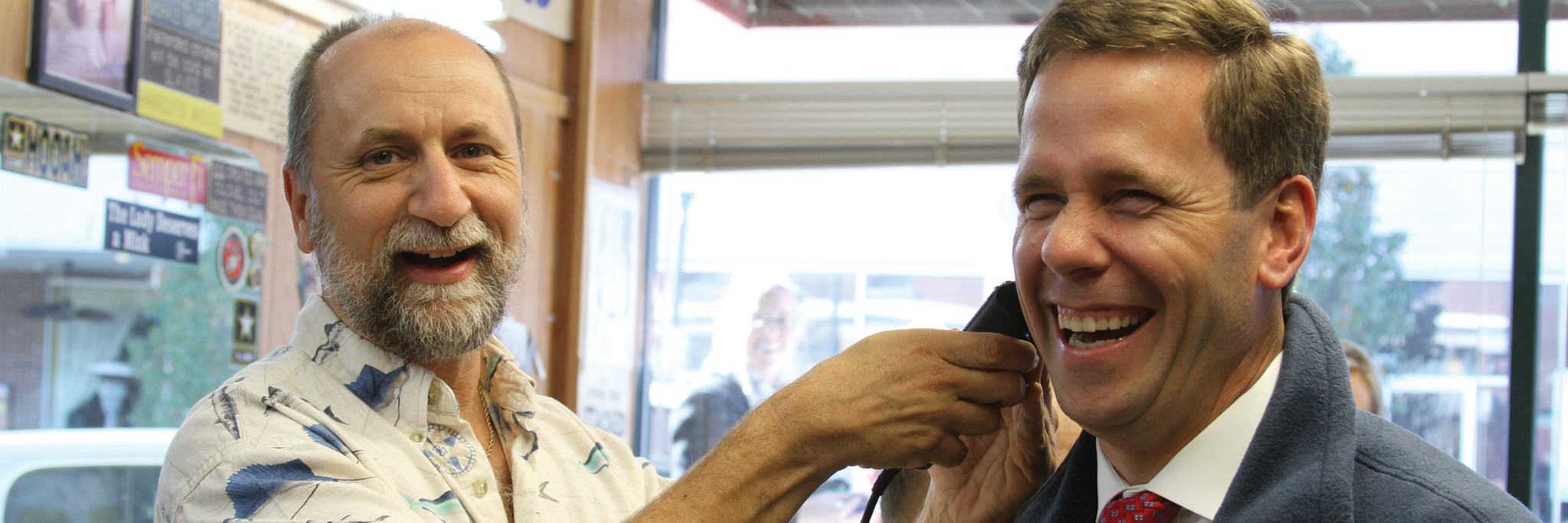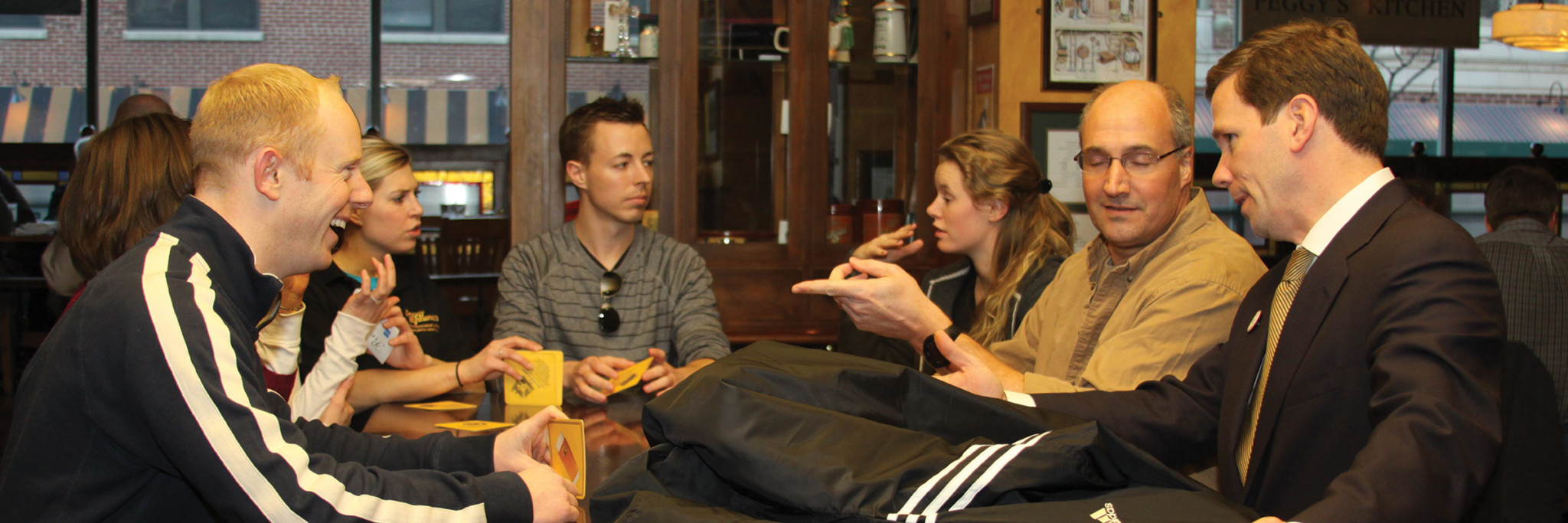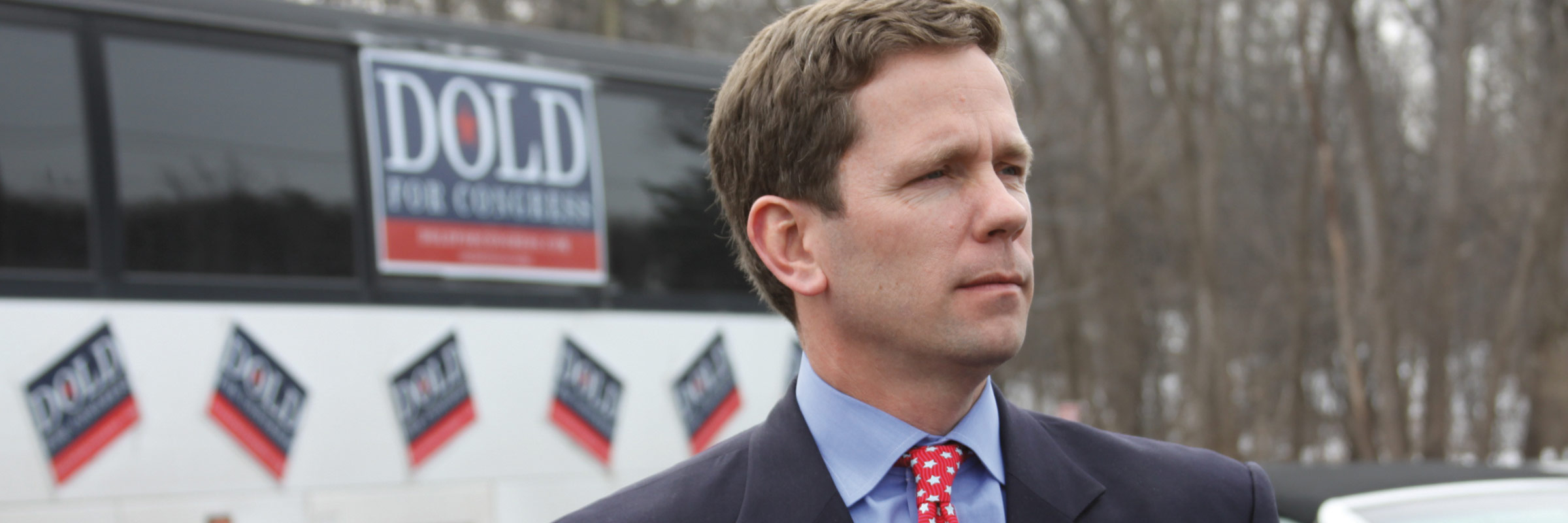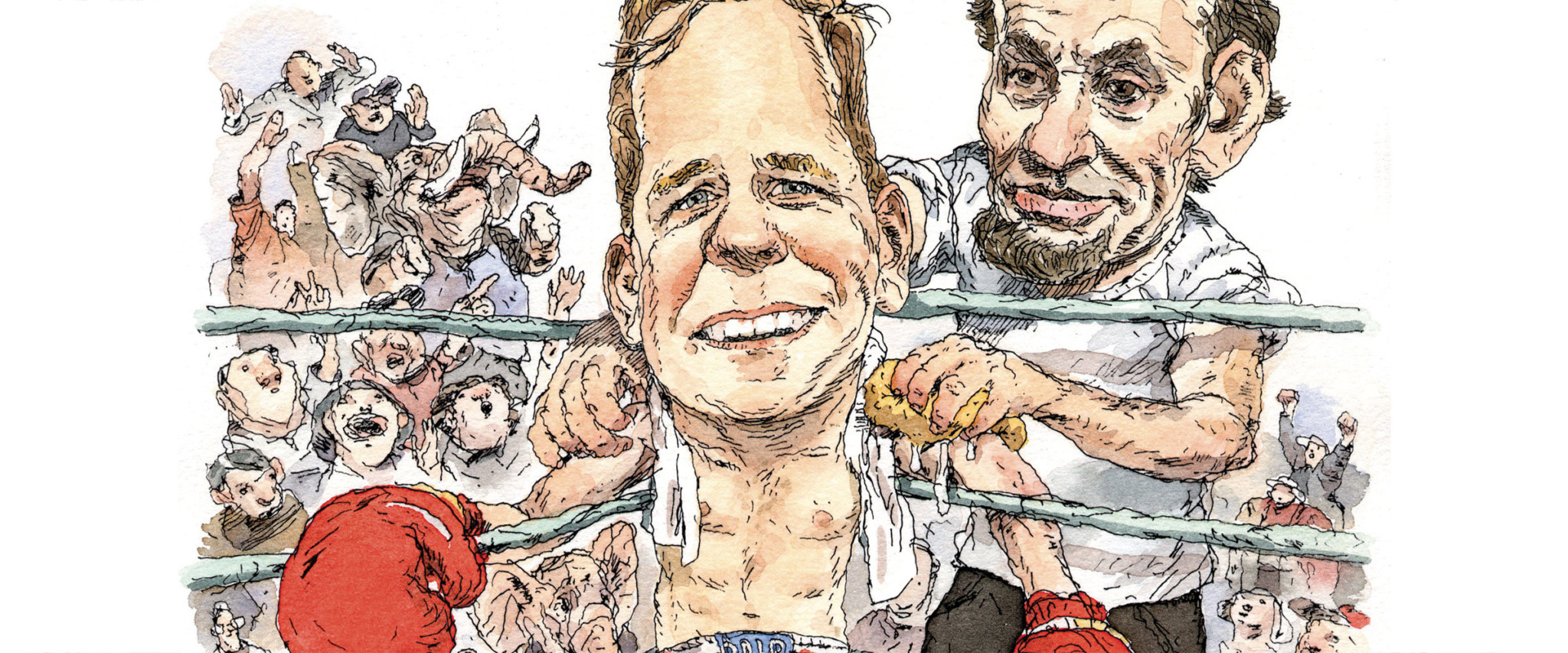Bob Dold ’91 is sitting beneath a framed oil portrait of Abraham Lincoln, in the Cannon House office building, only a few hundred yards from the U.S. Capitol. This is the D.D. headquarters for Dold, a freshman republican from the north-Chicago 10th congressional district. And the conversation he is having is very much like so many others of the last three months.
“Mr. Dold,” says Matt Hart, executive director of the Illinois Trucking Association, “we’ve got more than 6,000 truck drivers in the Chicago area, and they’re really concerned right now about rising fuel costs.”
Dold nods and leans forward in his chair. “I hear you, Matt, and I’m keenly aware of the problems you’re up against—”
But now he’s interrupted; a loud beeper has just started to go off. It’s coming from the TV set bolted to the wall above the Lincoln portrait. The screen begins to flash a continuous warning:
H.R. 1217—Repeal Prevention and Public Health Fund— Pitts/Energy and Commerce
15 minutes
The message means that Dold has 15 minutes to race over to the House Chamber if he wants to vote on House Resolution 1217, a bill aimed at eliminating several federal disease-prevention and public-health programs in order to help trim the federal budget.
Beep … beep … beep.
The trucking lobbyist speeds up his presentation. “Bob, I’ll keep this short—I know you gotta go vote. Our message for you today is that we badly need your help in keeping these fuel taxes from going up again.”
Dold is nodding again and straining forward in his chair. Like a thoroughbred at the gate, he’s waiting for the sprint toward the U.S. Capitol to begin. He assures Hart that he’ll do what he can.
Dold’s chief of staff, veteran congressional aide Eric Burgeson, stands in the doorway. He’s carrying a schedule-folder in one hand, and he’s got one eye on the TV set above Dold’s head. Burgeson doesn’t have to say anything. The moment they spot him, both Hart and Dold are on their feet. They’re shaking hands, saying goodbye. With a step that reveals a former quarterback for the Big Red (who today throws spirals to his legislative aides to wind down), Dold turns on a dime and hustles toward the doorway. Within 10 minutes, he’ll be casting a “yes” vote for the Republican- sponsored budget-cutting measure on the House floor.

Today is Wednesday, April 13th, and this is Bob Dold’s 100th day as a member of the 112th Congress. Almost the entire day—from his conversation with Hart to the House floor vote—will revolve around the issue of money and the problems of the national budget, the federal deficit, and the rising costs of just about everything. To Dold, a self-described fiscal conservative, the economic crisis has been a call to action—a chance to correct what he sees as a broken and misguided system and to put the United States back on firm footing.
Dold is no stranger to Capitol Hill. He spent two years serving as legal counsel to the House Government Reform and Oversight Committee, soon after graduating from law school in 1996, but he had never held an elective office before deciding to enter the congressional race in his native 10th District. “I took a long hard look at how the Illinois congressional delegation was representing voters in my state,” he says, explaining his motivation for throwing his hat into the ring last year, “What I saw was disillusioning, to say the least.”
As an experienced businessman who operated a regional pest-control company, and as a husband and father to three children, the rapidly growing national debt alarmed him. Later, while working as counsel with the Congressional Oversight Committee, Dold saw Washington politics first-hand. “I had gotten a good understanding of how the endless political infighting and needless partisanship that goes on in Washington was preventing us from dealing effectively with our fiscal problems. So I decided to see if I could help make a difference by getting elected to Congress myself.”
But the congressional neophyte knows that this will be no easy battle, either at home or in the Capitol.
Today will be like most of the other 99 days that have unfolded since he landed in Washington as a newly elected rep from the northern suburbs of Chicago. As a freshman legislator, Dold rode into the nation’s capital on a wave of reformist zeal as the Republicans took over the House, 242-193. But just 100 days in, and reelection is already a big topic among the congressman’s staff, because Dold is now locked in a political survival struggle back home with the 10th Congressional District ranking easily as one of the nation’s most complex electoral battlegrounds. Many of the Republicans in his politically complicated district regard themselves as enlightened progressives on social issues such as abortion, and as a result, the races in this district have historically been close calls. Dold, who bills himself as a fiscal conservative and social moderate, won a narrow victory over Democrat Dan Seals in the 2010 election, and Republican congressmen who have held Dold’s seat in years past have had to walk a delicate bipartisan line. The voters in the 10th district have repeatedly sent GOP congressmen to Washington for the past 30 years. At the same time, however, they’ve been unfailingly supportive of Democratic presidential candidates, voting heavily in favor of Barack Obama, John Kerry, and Al Gore in recent elections.

Getting elected in the district requires a tightrope walker with a keen sense of balance. “The 10th is a wealthy, socially moderate-to-liberal and fiscally moderate-to-conservative district which is actually tailor-made for a candidate such as Chris Kennedy [Bobby Kennedy’s son, and a district resident],” says Chicago Sun-Times political reporter Abdon Pallasch, who covered Dold’s victory in the 2010 election and is a nationally recognized expert on Chicago politics. “And you also have to remember that Democrats now control both houses and the governor’s office in Illinois…. The Democrats will do everything they can to make reelection difficult for Dold.” He’s a first-termer facing the country’s most divisive and heated budget debates while planning for the redistricting of his state’s political map, which will likely turn the 10th District largely blue. He has already been targeted by political analyst Charlie Cook as one of the country’s “most vulnerable” GOP congressmen heading into next year’s elections.
Still, the 41-year-old, slender, athletic-looking politico has some powerful advantages going for him. A close ally of recently elected GOP Illinois Senator Mark Kirk, he also will benefit from his close ties to such Washington heavyweights as veteran Indiana GOP Senator Richard Lugar ’54. And so far, he seems to be walking the line between left and right with some ease. Members of the Tea Party seem to like him. So do some liberals.
Among his other assets, Dold is a third-generation North Chicagoan with business experience, which may mean he understands the 10th District and the intricacies of campaign finance better than many of his Capitol Hill colleagues. And he’s an accomplished fund-raiser, able to bring in the big bucks.
But at this time, as Democrats and Republicans debate over the nation’s debt ceiling and federal spending, the strongest weapon in his political arsenal may very well be his fiscal conservatism. Indeed, his first real congressional triumph—the March 10 passage of a budget-cutting fiscal measure he sponsored—seemed designed to prove to Dold’s constituents that his campaign promises were for real. It also made him the first freshman of the 112th to pass a bill. HR 830, known as the “FHA Refinance Program Termination Act,” eliminated a program that had been designed to refinance homeowner mortgages that exceeded the value of the homes they financed. The pro- gram had restructured only 44 loans since its creation, and critics claimed it was wasting federal dollars. (In his first 100 days in office, Dold also has proven his ability to cross party lines. He partnered with fellow congressman Dan Lipinski of Chicago, a moderate Democrat, and introduced a bill that would penalize polluters of Lake Michigan.)

For Dold, the passage of HR 830 was a major coup, since it will allow him to buttress his claim that he’s all about reducing the number of dollars spent on wasteful federal programs. But, as Pallasch pointed out, the mostly affluent suburban residents of the 10th District seem to want more than fiscal conservatism. They are also decidedly moderate on social issues, and many of Dold’s critics claim that he often switches his positions (especially on difficult topics like abortion) in order to please his audience.
In one recent flap over the abortion issue, members of the conservative Right to Life movement in Illinois blasted Dold for voting against an amendment to “defund” Planned Parenthood, while insisting that Dold had promised he’d cut off the organization’s federal funding if elected. Bill Beckman, the director of the Illinois Right to Life Committee, charged Dold with “flipping” on the issue in Roll Call, a Capitol Hill newspaper, and a local democratic party blog headline read, “Will the real Robert Dold please stand up?” Dold, however, contends that he has not switched his position, and Dold’s aides simply offer up his consistent pro-choice voting record to combat such claims. The truth is, says the Dold camp, the congressman has never supported the use of taxpayer dollars to fund abortions and believes reducing funding to Planned Parenthood would negatively affect the other women’s health services offered by the organization.
Several other Dold critics in Illinois waxed indignant during last year’s campaign, after reportedly discovering that a Dold campaign operative had asked a conservative Tea Party publication to “give Dold a low rating” in its voter guide, so that he wouldn’t offend moderates in his district. “If he was truly the moderate he claims to be,” his opponent’s press secretary, Aviva Gibbs, wrote in an e-mail to Chicago’s Daily Herald, “he wouldn’t have to request a low rating from the Tea Party. He would simply earn one.” Dold, however, told Daily Herald reporters that a campaign worker did note that Dold was moderate, but he denies that the staffer asked for a low rating. He also insists that his positions on social issues such as abortion, gun control, and gay rights have been “consistently moderate” and “right in line” with the positions held by the majority of voters in his district. He points out that on more than 90 percent of the bills he’s voted on so far, he has followed the conservative guidelines recommended by his GOP peers. “I don’t flip-flop on issues,” he says to his critics. “What I do is vote my conscience—and when you do that, you can be sure that not everybody will be happy with the results.”

It’s early afternoon. Dold has just wolfed down a carry-out sandwich and a bag of potato chips in his office. He’s seated once again beneath Abe Lincoln’s solemn stare, listening intently to two representatives of the Chicago area’s largest hospital and clinical care provider, Advocate Health Care. Nodding and frowning thoughtfully, he takes notes on a yellow legal pad while Advocate Vice President of Government and Community Relations Meghan Clune fires off a five-minute barrage of health care statistics.
The bottom line: Both of the Advocate reps are worried about shrinking federal reimbursements for Medicare and Medicaid medical procedures in metro Chicago. “We’re deathly afraid of further cuts,” Clune says. “If they continue, we’re going to find it extremely difficult to serve the growing number of patients in Chicago who rely on those federal programs to get medical care.”
Dold responds by peppering the two hospital reps with questions for about 15 minutes, then promises to closely scrutinize current reimbursement rates—and to do everything he can to keep them at current levels.
While serving his constituents is Dold’s “first priority” each day, he must also stay on top of an unfolding struggle in the 112th Congress, which has proven to be one of the most rancorous and suspenseful congresses in memory, as the recently empowered Republicans go to war with the Dems over the next federal budget and strategies for reducing the massive federal deficit. After a near shutdown over budget cuts last April, the 112th is locked in a showdown over whether or not to extend the federal debt ceiling—and House Republicans have been warning for some time that they won’t allow any additional federal borrowing without huge cuts in entitlement programs and other spending reductions. “Obviously, we’re going to have to make some very difficult choices regarding the debt ceiling and budget-cutting,” says Dold. “Those choices will be complex, and they make the learning curve for a freshman even tougher.” As the battle over the budget continues, Dold and his GOP allies are doing their best to paint the Democrats (and the Obama White House) as profligate spenders whose “out-of-control spending on entitlements” is threatening to bankrupt the nation.
With a presidential election year looming, both parties will be doing their best to position themselves favorably with the voters on these key fiscal issues, which means that the infighting will be bloody and the political risks will be sky-high. And if Congress doesn’t reach some kind of compromise by August 3, the United States could default on its loans.
“I don’t think there’s any doubt that these debt and budget problems are the most important issues this congress now faces,” says Dold. “Somehow, we’ve got to get past all the political posturing on the budget and the debt. We’re in an economic crisis—and we have to jump-start this economy and find a way to create millions of jobs.”
As a father (each weekend he flies home to be with his children and wife Danielle, a Chicago-area tax attorney), the former Denison political science major believes the 112th Congress must protect the next few generations from the dangers of deficit spending, along with the dangers posed by international terrorism and ever-increasing economic competition all around the globe.
It’ll be an exhausting ride, but it doesn’t seem to faze him. “The thing you should know about Bob Dold is that nobody in Washington works any harder than he does,” says Burgeson. “Bob works us into the ground each day, and no matter how hard you might try, it’s impossible to keep up with him.”
Whether he’s struggling to master hundreds of pages of proposed legislation each week, staying up late to read about the problems faced by businesses in his district, or analyzing regional and national political trends to prepare for his reelection bid next year, Dold faces a mountain of new data each day that has to be fully absorbed and then acted on. “Starting your first term in Congress is tough, very tough,” he says. “Part of the problem is that you have to get up to speed very quickly. The learning curve is extremely steep. The mentoring you get is quite helpful, but it only goes so far. I studied law after Denison [at Indiana University], and I also studied for an M.B.A. at Northwestern. Those were intellectually challenging experiences, to be sure— but there’s nothing more difficult than your first few months as a congressman.”
Ask Dold why he’s willing to subject himself to the endless stresses of life as a freshman congressman, and he doesn’t hesitate. “If I didn’t believe America’s best days are still ahead of us, I wouldn’t be here,” he says as he hurries along beneath the Capitol dome en route to a staff meeting.
“I do believe we can leave this country a better place for the next generation. We live in the greatest nation on the face of the earth, and I think we’re fully capable of making things better for our children and their children. All we have to do is roll up our sleeves and get to work.”
Tom Nugent is a freelance writer based in Hastings, Mich. His work has appeared in The New York Times and People magazine. He is the author of Death at Buffalo Creek.

